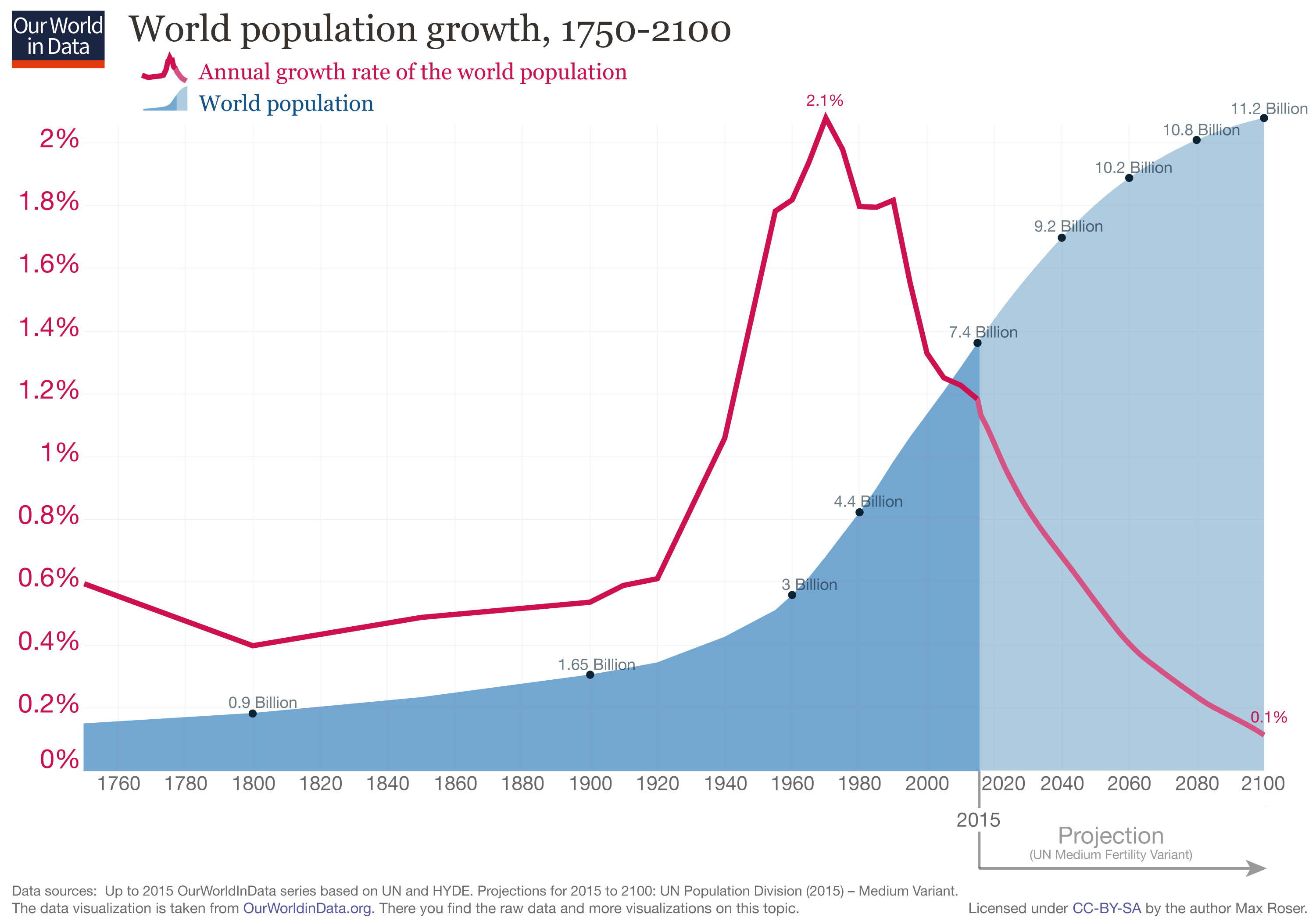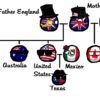【社会】あと少しで世界人口は減少に転じる可能性:鍵は女性の教育水準
人口は増えるもの―、経済は成長するもの―。誰もがそう考えたとき、時計の振り子はすでに逆に振れ出しているのかもしれません。
今日は、誰も疑わない国連人口推計の妖しさに関する話です。出生率は政策では動かせない、女性のこころ次第だというのです。
国連の人口推計って合ってる?
インターネットで人口予測を調べると判で押したように国連の人口推計がベースになっています。でも「もし国連が間違っていたら?」という疑問に答える本が先ごろ出版されました。

今回は、Wired誌の以下の記事を紹介します。
THE WORLD MIGHT ACTUALLY RUN OUT OF PEOPLE
(実際は人がいなくなり始めそうな世界)
『Empty Planet』(空っぽの地球)の衝撃
YOU KNOW THE story. Despite technologies, regulations, and policies to make humanity less of a strain on the earth, people just won’t stop reproducing. By 2050 there will be 9 billion carbon-burning, plastic-polluting, calorie-consuming people on the planet. By 2100, that number will balloon to 11 billion, pushing society into a Soylent Green scenario. Such dire population predictions aren’t the stuff of sci-fi; those numbers come from one of the most trusted world authorities, the United Nations.
こういう話を聞いたことがあると思う。どんな技術、規制、政策をもってしても「人口増加が止まらない」とか「人類が地球にかける負荷は減っていない」とか。炭素を燃やし、プラスチックで汚染し、カロリーを消費する人類は2050年には90億人、2100年には110億人に膨れ上がる。映画『ソイレント・グリーン』の悪夢が現実になる、というわけだ。こういう切迫した人口推計はSF作家が捻りだしたものではない。最も信用ある世界機関のひとつ国連が算出したものだ。
But what if they’re wrong? Not like, off by a rounding error, but like totally, completely goofed?
That’s the conclusion Canadian journalist John Ibbitson and political scientist Darrell Bricker come to in their newest book, Empty Planet, due out February 5th. After painstakingly breaking down the numbers for themselves, the pair arrived at a drastically different prediction for the future of the human species. “In roughly three decades, the global population will begin to decline,” they write. “Once that decline begins, it will never end.”
でも、もし国連の予測が間違っていたら?誤差の範囲どころか完全に見当違いだったら?
本当に外すのでは、というのが2月5日に発売されたばかりの『Empty Planet』(空っぽの地球)の結論だ。共著者のカナダのジャーナリストJohn Ibbitsonと政治学者Darrell Brickerは、苦心の分析の末、国連とはまったく違う人類の未来予測にたどり着いた。一部を引用すれば「世界の人口はおそらく30年以内に減少に転じる。いったん減り始めればもう増えることはない」。
But Empty Planet is not a book about statistics so much as it is about what’s driving the choices people are making during the fastest period of change in human history. Ibbitson and Bricker take their readers inside the Indian slums of Delhi and the operating rooms of Sao Paulo, Brazil, to eavesdrop on the conversations young professionals have at dinner parties in Brussels and over drinks at a young professionals’ club in Nairobi. The end result is a compelling challenge to long-entrenched demography dogma, Trojan Horse-d inside an accessible, vivid portrait of modern families from every walk of life. The authors sat for an interview about how they arrived at a radical new outlook on the human race and its implications for future societies.
この本の眼目は統計そのものにはない。人類史上最速の変化の時代、何が人々の選択を突き動かしているかを考察することが主眼だ。二人はインド・デリーのスラム街やブラジル・サンパウロの手術室に取材し、ブリュッセルのディナーパーティーやナイロビの会員制クラブで交わされる若いプロフェッショナルたちの会話に耳をそばだてた。彼らは現代のあらゆる階層の家庭像を明解に生き生きと描き出したが、その内側には意外な真実が隠れていた。二人の最終結論は人口統計学の長年の固定観念に真っ向から挑む内容だ。彼らはどうやってまったく新しい人類の展望、未来社会への示唆を得たのか―、それを知りたくてインタビューを試みた。
例:Amy Trojan Horsed John; John believed Amy when she told him she loved him dearly while she was having a fling with James.(エイミーはジョンを出し抜いた。ジョンはこころから愛してると言ったエイミーを信じていたが、彼女はジェームズとよろしくやっていた。)
国連の人口動態予測と実地調査のズレ
WIRED: The UN is a well-regarded authority on everything from public health to food security and global economics. What made you think that they were getting population growth wrong?
本誌:公衆衛生や食料安全保障、あるいは世界経済に関して国連は定評ある機関です。お二人が国連の人口増加予測が間違いだと考えたのはなぜでしょう?
JI: The UN population data is something we call vertical knowledge, or “everybody knows” knowledge. Whether it’s the prime minister of a country, a university academic, a business leader, a student, just a guy on the street, you ask any of them, “What is happening with population?” and they go, “Oh it’s terrible, there’s a huge population explosion. I was just watching a movie last night where Earth got so crowded everyone had to relocate to the moons of Jupiter.” It’s just deeply embedded.
JI:国連の人口動態データは縦割り知識、いわば「みなが知っている」知識です。一国の首相でも大学の学者でも会社の社長でも学生でも通りすがりの一般人でも誰でもいいですが、「地球の人口はどうなると思いますか?」と尋ねてみてください。オウム返しで「そりゃひどい、人口爆発だよ。ゆうべも地球が混み過ぎて、みんなが木星の惑星に移住しなくちゃいけない映画を見たよ」と返ってきます。深く刷り込まれた知識なんです。
DB: And whenever that happens you should really go and look hard at the assumptions, and test them yourself, because most of the time reality has already moved past where that vertical knowledge resides.
DB:そう言う場合は必ず前提条件をよく調べ、自分自身で検証してみる必要があります。縦割り知識がすでに過去のものになっていることはよくありますから。
JI: So that’s what we did. And it didn’t take long before we realized that there was a whole body of demographers who have been questioning the UN’s numbers for years. They’ve just been talking to each other at conferences and through scholarly articles, but they’ve never gotten this information before the general public. That was kind of our starting point. And then when we went out and talked to real people in the world about the choices they’re making, that’s when the statistics we were seeing came to life.
JI:実際、自分たちで検証したのです。すぐわかったのは、国連の統計に疑問を呈する人口統計学者が、何年も前から大勢いることでした。でも、それは専門会議や学術論文の上での話で、彼らが一般に情報を出したことはありません。そこが我々の出発点みたくなったわけです。それからは世界のあちこちに出かけて、実際の人々が行っている選択について訊き、データと照らし合わせました。統計データが命を宿した瞬間です。
You traveled all over the globe to interview people for this book. What’s one image or conversation that really made the statistics jump off the page?
お二人はこの本のために世界中の人々にインタビューされています。何か統計データが紙から飛び出してくるようなエピソードやことばはありますか?
DB: There was a moment when we were sitting in this little school in Sriniwaspuri, listening to a focus group of 13 or 14 women who lived there. And I kept seeing this faint glow light up under their saris. I didn’t know what it was. And then I saw one woman reach in and pull out a smartphone, look at it, and put it back. And I realized, here we are in a slum in Delhi, and all these women have smartphones. Who can read. Who have data packages. And I was thinking, they have all of human knowledge in their hands now. What’s the impact of that going to be?
DB:スリニヴァスプリの小さな学校での経験ですね。現地の13、14人の女性をフォーカスグループにして聞き取りをしていたときのことです。彼女たちのサリーの中がほのかに光っているのに気づきました。そのときは光の正体が何だかわかりませんでした。ところが別の日、一人の女性がサリーの中からスマホを取り出し、ちらっと見てすぐしまったんです。このデリーのスラム街でも全員がスマホを持ってるわけです。彼女らは文字も読めるし、データパッケージも持っている。そして思ったんです、彼女らはすでに人間のあらゆる知識にアクセスできるんだって。それが彼女らにどんな影響を与えると思いますか?
Well, what is it?
さあ、どんな影響でしょう?
DB: So, the UN forecasting model inputs three things: fertility rates, migration rates, and death rates. It doesn’t take into account the expansion of education for females or the speed of urbanization (which are in some ways linked). The UN says they’re already baked into the numbers. But when I went and interviewed [the demographer] Wolfgang Lutz in Vienna, which was one of the first things we did, he walked me through his projections, and I walked out of the room gobsmacked. All he was doing was adding one new variable to the forecast: the level of improvement in female education. And he comes up with a much lower number for global population in 2100, somewhere between 8 billion and 9 billion.
DB:国連の動態予測のインプットは出生率、移住率、死亡率の3つだけです。女性への教育の普及や都市化のスピードは、(これらはどこかで関連しているわけですが)考慮に入れていません。国連はそういうファクターも数字に織り込まれていると言います。でも、調査の始めの頃、ウィーンの人口統計学者ヴォルフガング・ルッツにインタビューしたときです。ルッツは彼の予測データを一通り見せてくれたのですが、エーっていう感じで部屋を出ました。彼がたったひとつ、女性の教育向上という変数を足しただけで、2100年の人口推計は90億から80億人までがたんと下がったんです。

女性のこころが最大の生殖器官
JI: Lutz has this saying that the most important reproductive organ for human beings is your mind. That if you change how someone thinks about reproduction, you change everything. Based on his analysis, the single biggest effect on fertility is the education of women. The UN has a grim view of Africa. It doesn’t predict much change in terms of fertility over the first quarter of the century. But large parts of African are urbanizing at two times the rate of the global average. If you go to Kenya today, women have the same elementary education levels as men. As many girls as boys are sitting for graduation exams. So we’re not prepared to predict that Africa will stagnate in rural poverty for the rest of the century.
JI:ルッツの考えでは人間の最も重要な生殖器官はこころ(思想)です。生殖に対する考えが変われば、他もすべて変わる。彼の分析によれば、出生率を左右する唯一最大の因子は女性の教育水準です。国連のアフリカに対する見方は悲観的です。21世紀最初の25年、出生率はほぼ横ばいと予想しています。しかしアフリカの大半では世界平均の2倍のペースで都市化が進んでいます。いまのケニアでは、女性は男性と同じ初等教育レベルにあります。男子と同じ数の女子が卒業試験を受けています。ですから農村部の貧困でアフリカ全体が停滞し続けると予測しうる根拠はありません。
DB: And that’s just one cultural variable. So you can say that the old models always worked in the past, but what if the past is not prologue? What if we’re moving into a different cultural moment? What if it’s accelerating? And what if that cultural moment really is about the personal decisions women make about their lives?
DB:しかも、教育水準は文化変数のひとつに過ぎません。これまで予測モデルが機能してきたからと言って、過去が人口爆発物語のプロローグだと決めつけていいものでしょうか?世界の文化に地殻変動が起きているとしたら?しかも変化は加速しているとしたら?その変化を生んでいる本当の文化的契機が、自分の人生を自分で決められる女性だとしたら?
JI: We polled 26 countries asking women how many kids they want, and no matter where you go the answer tends to be around two. The external forces that used to dictate people having bigger families are disappearing everywhere. And that’s happening fastest in developing countries. In the Philippines, for example, fertility rates dropped from 3.7 percent to 2.7 percent from 2003 to 2018. That’s a whole kid in 15 years. In the US, that change happened much more slowly, from about 1800 to the end of the Baby Boom. So that’s the scenario we’re asking people to contemplate.
JI:我々は26か国の女性に何人子どもが欲しいかを尋ねました。返ってきた答えは例外なく2前後でした。これまで大家族化を促してきた外部の圧力はどの地域でも消えつつあります。しかも発展途上国で最も速く消えているのです。例えばフィリピンの場合、2003年に3.7%あった出生率は2018年には2.7%まで低下しています。たった15年で子どもが一人減っている計算です。アメリカの出生率は1800年頃からベビーブームの終わりにかけて、長くゆっくりと進みました。我々としては、この本で示したシナリオをみなさんによく考えてもらいたいのです。

いまの硬直した予測モデルのまま未来を計画していいのか?
WIRED: OK, but so what though? Why does it matter who’s right or wrong?
本誌:わかりました。でも、だから何だと言うのですか?誰が正しいか間違っているかが、なぜ重要なのですか?
DB: A lot of people who are thinking about the future of the world, the future economy, the future of city planning, they’re basing their projections on that future size of the human population. And people are actually making decisions based on this. If you dig in and see that there isn’t going to be a lot of growth of young people coming into the population, a lot of growth is actually going to come from older people hanging around longer because we’re getting better every day at keeping them alive. How does that affect transit decisions in New York City? Or how governments support rural communities that are collapsing at an enormous rate right now. All those decisions are based on having a correct understanding of what our societies will look like in the future.
DB:いま未来の世界を考え、未来の経済や都市計画を構想している人たちの多くは、権威ある人口推計に基づいて計画を立てています。計画だけでなく、予測をベースに実際の意思決定が下されています。若者の増えない世界というのをよく考える必要があります。そういう世界での人口は、若者にぶらさがる年長者かかさ上げしています。生活環境の向上で益々長寿化が進んでいるわけですから。じゃあ、そのことがニューヨーク市の交通行政に与える影響は?あるいは急激に崩壊しつつある地方のコミュニティを政府はどう支援すべきでしょう?正しい政策決定を下したければ、未来の社会がどうなっているのか、もっと正確に理解すべきではないでしょうか。
<引用記事終わり>
人口減少社会が人類の進化スイッチを押すのか?
この記事にも書いたように、以前から女性の男性化が気になっていました。一時的な現象に見えなかったからです。
個人的に「男社会」はもうやめた方がいいと思います。ですから「男社会」が「強い女性」を味方に引き入れ、結局は男社会を延命させているのはイヤだなと思います。と同時に「強い女性」のみなさんにはぜひ「男社会」をぶち壊してほしいです。
それにしても人口問題を女性の思想(教育水準)が左右するというのは痛快な話ですね。「男社会」なんかよりずっち根源的なレベルのことですから。結局、男なんて女性のチョイス次第なわけです。
衝撃的なのは「人口はいったん減り始めると二度と元に戻らない」という説です。これには深く考えさせられます。やはりホモサピエンスはAIなどの技術を駆使して、生命体とは違う何かへ進化していくのでしょうか?
関連記事
少子化問題を扱った記事です。
男と女のせめぎあいに関する記事です。太古の人類は母権社会が基本だったそうなので、ここ1万年程度の父権社会が例外だった可能性があります。
歴史家ハラリ氏はホモサピエンスの進化形としてホモデウス(神化した人類)の登場を予想しています。人口減社会の究極の対策は滅亡か、非生命体への進化しかありません。後者を選択するはずだというのです。














ディスカッション
コメント一覧
まだ、コメントがありません